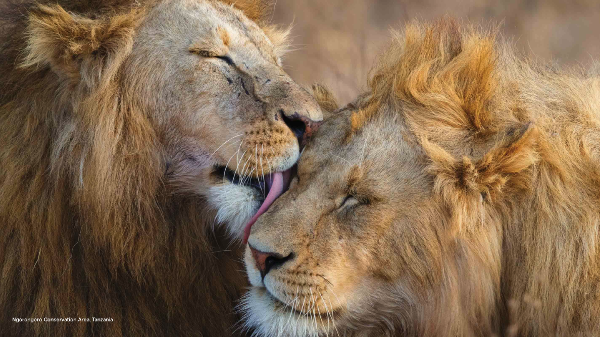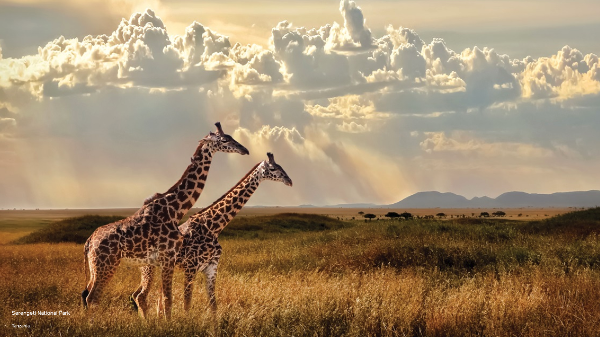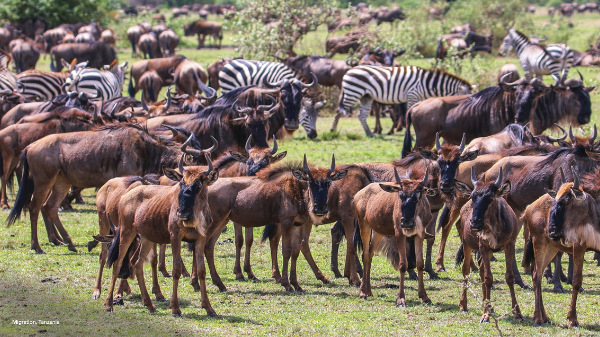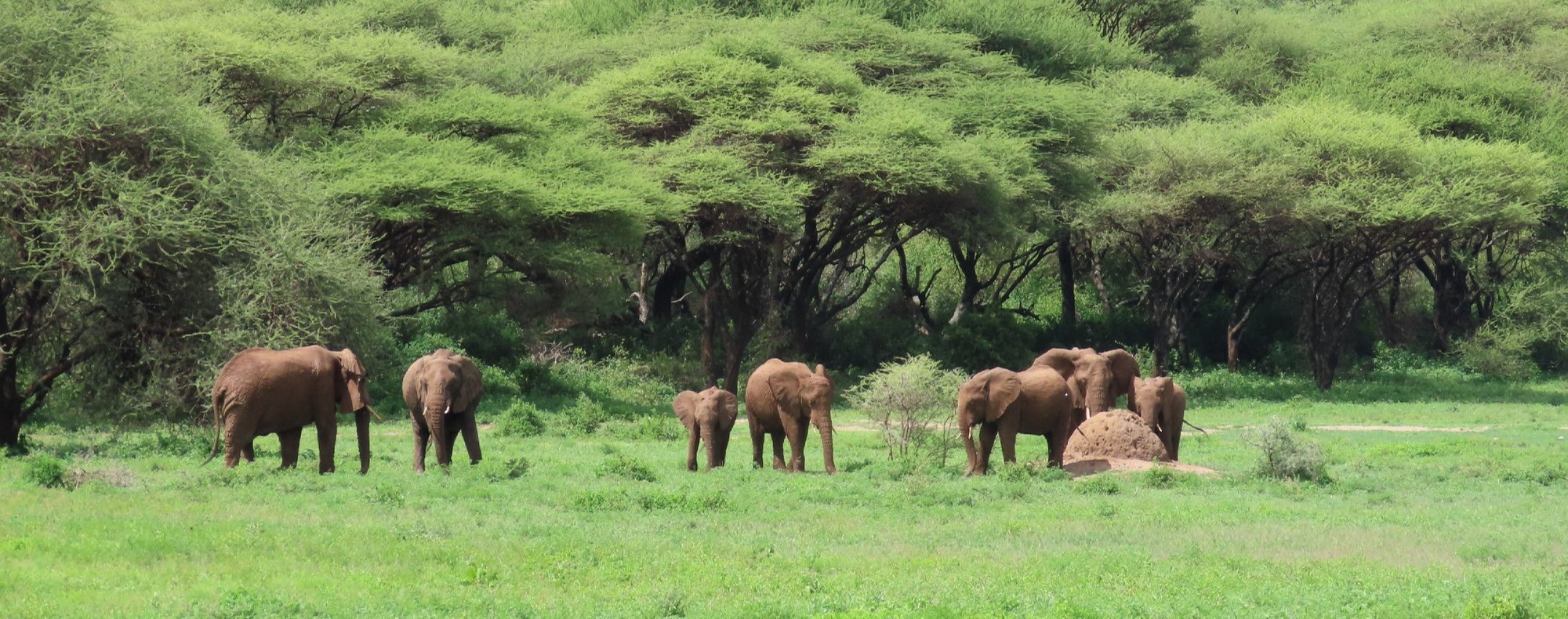By Colin Treadwell

Our South African ranger guide, Mo, pointed to a group of antelopes, some of which were prancing with their feet held together, so that they bounced high, as if on pogo sticks. “They are pronking,” he explained.
“What is that?” asked a lady in our Range Rover. “Why do they do that?”
“It’s just an expression of joy,” said Mo. “They are just playing.”
Funny, I remember the wildlife documentaries I watched on TV as a kid as dry and analytical, laced with scientific jargon based on Darwinian theory, all about natural selection and the struggle to survive. That aspect was real out in the bush, but there was so much more that was missing from the documentaries. The joy! Animals having fun! The beauty and rapture of nature.
The scientific viewpoint is supposed to remain detached, not affected by emotion. That’s appropriate for scientific research. But when it commands the narrative of a cinematic presentation of the wilderness on that little screen, it misses a lot. The ecstasy, the splendor! Love! You see the tenderest love among the predators. Even though there are predators, and a struggle for survival, there is so much more when you experience it in person.
Even when the predators are closing in on a herd of zebra, wildebeests or antelopes, the animals maintain such amazing poise that it’s awe-inspiring. If I could be that composed in the presence of death, I would be a much greater human than I am.

Metanoia: A Change of Consciousness
A safari can change your fundamental world view. It certainly did mine. I can’t imagine that it doesn’t have the same effect on most others who experience it for the first time. More than any other travel experience I can think of, going on safari palpably shifted the foundations of my existence.
The word “metanoia,” defined as a change of mind, is historically associated with religious conversion. But it seems appropriate here. The wilderness is where adventure merges with spirituality.
I recently returned from South Africa and the latest of many safaris I’ve taken, and I can’t say if the change I am talking about was gradual, or if it happened almost instantly. I think it was both. Some say you never forget the first time you fell in love. You never forget your first time, and so it was with me with safaris. That one pushed me through a transition to a wider world, and the change was irreversible.
Watching the interaction between the predators and their prey was disturbing, but also enlightening. It changed my way of looking at my own life and my place in nature. That was ground zero of the change, and it’s been rippling and widening in circumference ever since. Every safari is different. Nature produces endless novelty. All my later safari experiences have built on that foundation as I have kept deepening and refreshing my understanding of nature.
It’s a struggle to describe this change to someone who hasn’t experienced it. It took me totally by surprise because I didn’t yet know what I didn’t know. If you have not experienced it, it’s hard to get beyond the mere words of a description.
That first change was like an imprinting process, as when goslings imprint on their mother, and then follow her. Or the experience of falling in love. Your orientation in the world is shifted. Your world has grown, added a dimension.
My raving about safaris is odd because I didn’t have a great desire to go on safari before that first experience. When I first traveled to Africa, I was more interested in the people: the culture, the history, the music, the art, the food, the clothing. I didn’t classify myself as the sort of wildlife enthusiast that I imagined went on safari.
My first African trip was to Kenya, and I did enjoy the human side of the trip, the city life of Nairobi, the rural life of the villages, the unique groups such as the Maasai, who are so remote in culture even from the Black Africans in Nairobi or the villages. I wanted to experience a safari, but I was not a big safari enthusiast at that point. That dimension had not opened to me before. When it did, my mind never returned to its previous dimension.
I didn’t know what I was missing growing up inside the fences and walls of civilization. God knows I love the great comforts and creations of civilization. I nourish my soul greatly with those cultural artifacts, music, literature, art… central heating! Still, being confined entirely within the walls and barriers of civilization does have the effect of narrowing your horizons. Going into the African wilderness stretched the boundaries of my world tremendously.
The big change in my perception took place when I got to the high plains of Kenya and experienced life in the wilds, with big carnivores unrestrained by cages or fences. They are out there the same way they were thousands of years ago before there was what we now call civilization.
It was when I saw how the battle for survival plays out in a place where the touch of humanity is of little consequence, that I could finally see the limitations of the world I grew up in.

The Urban Ecosystem
I did have some experiences with animals growing up in the Midwest. Nearly all were domestic animals: cows, horses, chickens, dogs, cats on my grandfather’s farm. We had little exposure to wild animals in town, except birds.
And there was, of course, the zoo, which to me was terribly dreary.
There was a large creek near my home in the suburbs, which was a great ecosystem full of animals such as crawfish, frogs, toads, snakes, bugs. So I got to experience those guys in their natural environment. But it was only the little animals that managed to live that close to civilization.
Like others of my generation, my main exposure to big wildlife was through documentaries on TV. They were great, and I am grateful for them. They probably helped to keep alive the sense of wonderment about animals that would later fuel my pleasure in taking a safari.
But as good as they were, the animals were encased in the framing of a photograph, packaged in the descriptions of a narrator. When you get out in the wilds, the packages are gone, the fences, the cages, the scientific explanations. It’s direct experience. You are there. No one knows exactly what will happen. It’s not scripted. It’s always novelty, the unexpected. As my ranger guide Mo said, “The animals don’t read the books.”
You experience a safari through the knowledge and experience of your guides. Their explanations are extremely valuable to help you understand what you are seeing.
But their explanations aren’t based on principles in a biology textbook, but rather on their day-to-day experience with the animals in the wilds. The rangers are out there every day, and they never get tired of it, because it is constantly changing. It’s probably a more varied environment than most of our workplaces. By being there every day, they know well that nature is never totally predictable.
Out there in the bush you see life in its primordial form, the foundations of the civilization in which we all live. Once you experience that, you never see the world quite the same again.
Your humble reporter,
A. Colin Treadwell

About the author
TRAVELINK
TRAVELINK is headquartered in Nashville, Tennessee and operates nationally with a combination of boutique business call centers and a national network of experienced virtual business travel and leisure travel advisors. Travelink’s client base includes a range of Fortune 500 Corporations, small to mid-market companies, as well as clients from the entertainment industry, sports teams, groups, and religious & non-profit organizations.
Topics: New, Luxury, Custom Travel, Safari, Africa
